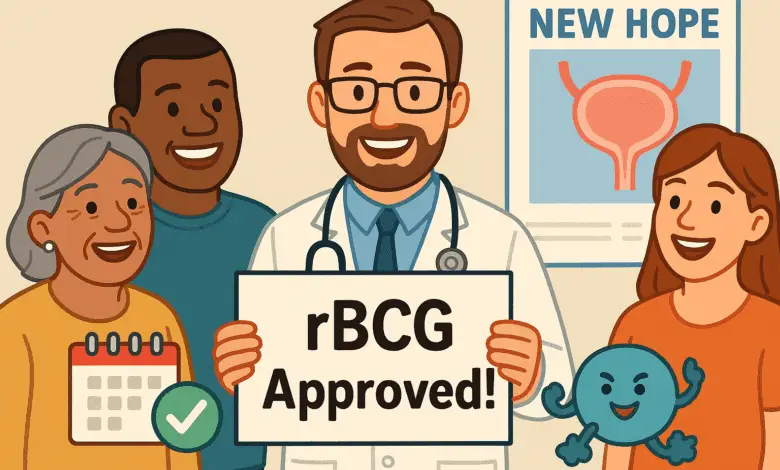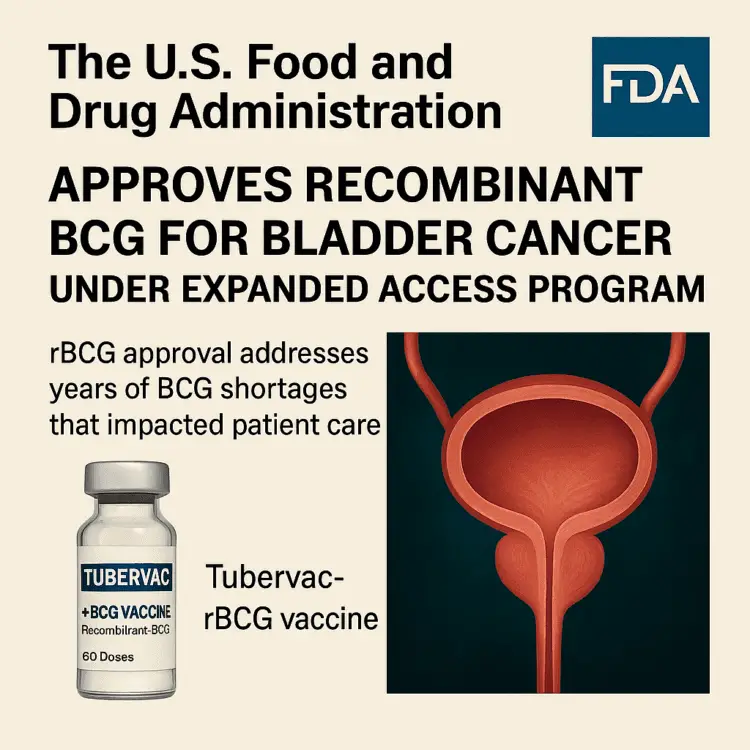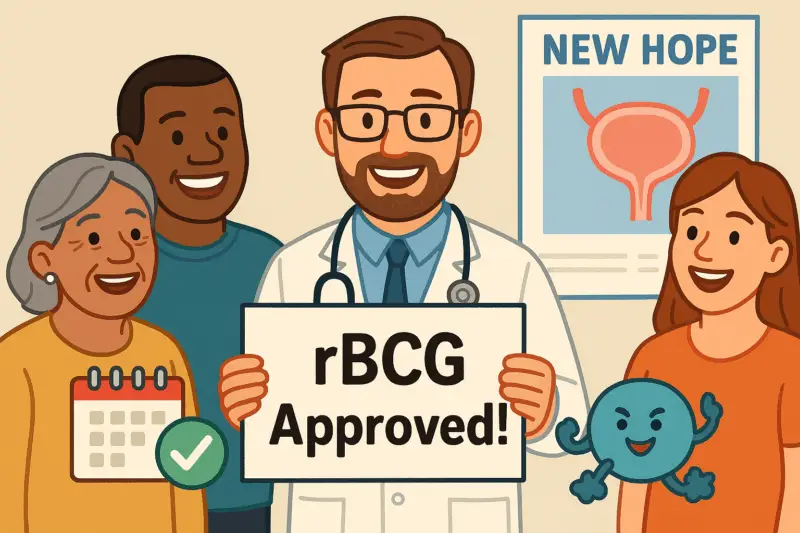
FDA Allows Use of Recombinant BCG Through Expanded Access Program
Recombinant BCG Offers Fresh Promise in Bladder Cancer Care
The U.S. Food and Drug Administration (FDA) has approved a new version of the BCG treatment for bladder cancer. This updated treatment is called recombinant BCG (rBCG) and will be available through the Expanded Access Program.
This approval is a major step forward. For years, there has been a shortage of the original BCG treatment. This has caused serious problems for patients and doctors across the country.
The new rBCG offers hope. It’s based on advanced science and early studies suggest it could be safer and more effective. The Expanded Access Program means patients who can’t wait for full approval can still receive this promising treatment.
In this article, we’ll explain the history of the BCG shortage, what rBCG is, and how patients can access it.
Here is an Easy Read version of press release below
The U.S. Food and Drug Administration (FDA) has recently approved the use of recombinant Bacillus Calmette-Guérin (rBCG) through an Expanded Access Program, marking a significant development in the treatment of bladder cancer. This decision comes after years of BCG supply shortages that have challenged the medical community and affected patient care nationwide.

Background on BCG Shortage Crisis
BCG, a live attenuated strain of Mycobacterium bovis, has been the gold standard treatment for non-muscle invasive bladder cancer (NMIBC) since the 1970s. It works by stimulating an immune response against cancer cells when instilled directly into the bladder. However, manufacturing challenges and increasing global demand have led to persistent shortages over the past decade.
The conventional BCG supply chain faced significant disruptions when Merck, the sole U.S. manufacturer of TICE BCG, experienced manufacturing constraints. These shortages forced urologists to adopt dose-sparing strategies, delay treatments, or resort to less effective alternatives, potentially compromising patient outcomes. According to surveys, 57% of
urologists reported being unable to treat patients in the previous 12 months due to lack of access to TICE BCG.
Recombinant BCG: A Breakthrough Solution
Recombinant BCG represents a biotechnological advancement over the traditional BCG vaccine. The specific product approved under the Expanded Access Program is “TUBERVAC-rBCG vaccine” developed by the Serum Institute of India, with ImmunityBio serving as the U.S. partner administering the program.
The rBCG has demonstrated potent immunogenicity with CD8+ and CD4+ T cell stimulation and improved safety compared to earlier BCG strains in clinical trials.
The Expanded Access Program Framework
The FDA’s Expanded Access Program, sometimes called “compassionate use,” provides a pathway for patients to receive investigational treatments outside of clinical trials when no comparable alternatives exist. For rBCG, this means that eligible bladder cancer patients facing limited treatment options due to the BCG shortage can now access this novel therapy.
The program operates under strict protocols with specific eligibility criteria for patients, including “histologic confirmation of BCG-naïve NMIBC CIS or stage Ta and/or T1 papillary tumours, an absence of resectable disease after TURBT, and an ECOG performance score of 0, 1, or 2.”
Clinical Evidence Supporting the Decision
The FDA’s decision follows review of data from clinical trials evaluating rBCG in patients with NMIBC. A Phase 1/2 trial with 40-42 patients showed a recurrence-free rate of 49.3% at 60 weeks.
As of March 2025, U.S. Urology Partners has become the first site to offer rBCG through the Expanded Access Program, with 60 additional sites in the process of launching.
Manufacturing and Distribution Considerations
Unlike the challenges faced with traditional BCG production, the partnership between ImmunityBio and the Serum Institute of India aims to establish a more reliable supply chain to address the ongoing shortage crisis.
Future Implications
Beyond addressing the immediate supply shortage, the authorisation of rBCG through the Expanded Access Program represents an important step in ensuring that bladder cancer patients have access to this critical therapy.
Perspectives from the Medical Community
The announcement has generated cautious optimism among urologic oncologists. The medical community will be closely monitoring both the practical distribution challenges and clinical outcomes as implementation of the Expanded Access Program continues.
Patient advocacy groups have emphasised the importance of ensuring the expanded access program reaches patients across all communities and healthcare settings.
Easy Read Version
This section explains everything in easy read writing.
New Help for People with Bladder Cancer
The U.S. Food and Drug Administration (FDA) has approved a new treatment for bladder cancer.
It is called recombinant BCG or rBCG for short.
People with bladder cancer can now get this treatment through a special program called the Expanded Access Program.

What Is BCG and Why Is It Important?
- BCG is a medicine that helps treat a type of bladder cancer.
- It works by helping your body fight cancer cells in the bladder.
- Doctors have used BCG since the 1970s.
- But there has not been enough BCG in recent years.
- This made it hard for many people to get the treatment they needed.
Why was there a shortage?
- One company in the U.S. made most of the BCG.
- They had problems making enough of it.
- So, many doctors had to:
- Use less of the medicine.
- Wait to treat patients.
- Use other treatments that don’t work as well.
What Is Recombinant BCG (rBCG)?
- rBCG is a new and better type of the BCG medicine.
- It was made using modern science.
- It is made by a company in India and given in the U.S. by another company called ImmunityBio.
Why is it better?
- It is safer for many patients.
- It helps the immune system work better.
- It has been tested on people and shows good results.
What Is the Expanded Access Program?
- Some people cannot join drug trials or wait for full approval.
- The Expanded Access Program helps these people get new treatments early.
- It is also called compassionate use.
Who can get rBCG this way?
- People who have certain types of bladder cancer.
- People who have not had BCG before.
- People who are well enough to try a new treatment.
What Do We Know from Studies So Far?
- In a study with about 40 people:
- Almost half (49%) stayed free of cancer for over a year.
- More hospitals in the U.S. are starting to give this new treatment.
- One group, U.S. Urology Partners, is already using it.
- 60 more hospitals will offer it soon.
Making and Sharing the New Medicine
- Making rBCG is easier than making the old BCG.
- Two companies are working together to make sure there is enough medicine for everyone who needs it.
Why This Matters
- Many people with bladder cancer could not get the treatment they needed before.
- This new rBCG medicine gives them a better chance at fighting cancer.
What Doctors and Patients Are Saying
- Doctors are hopeful but still careful.
- They want to make sure the new medicine works well.
- Patient groups want to make sure people in all areas can get the medicine, not just big hospitals.
What You Can Do
- Talk to your doctor if you have bladder cancer and want to know more about rBCG.
- Ask if you can join the Expanded Access Program.